英语资料
基础英语学习资料
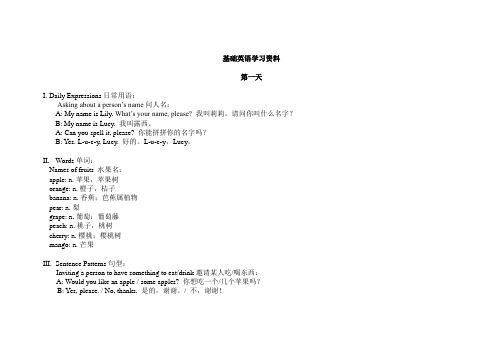
基础英语学习资料第一天I.Daily Expressions日常用语:Asking about a person’s name问人名:A: My name is Lily. What’s your name, please?我叫莉莉。
请问你叫什么名字?B: My name is Lucy. 我叫露西。
A: Can you spell it, please? 你能拼拼你的名字吗?B: Yes. L-u-c-y, Lucy. 好的。
L-u-c-y,Lucy。
II.Words单词:Names of fruits 水果名:apple: n.苹果,苹果树orange: n.橙子,桔子banana: n.香蕉;芭蕉属植物pear: n.梨grape: n.葡萄;葡萄藤peach: n.桃子,桃树cherry: n.樱桃;樱桃树mango: n.芒果III.Sentence Patterns句型:Inviting a person to have something to eat/drink邀请某人吃/喝东西:A: Would you like an apple / some apples? 你想吃一个/几个苹果吗?B: Yes, please. / No, thanks. 是的,谢谢。
/ 不,谢谢!IV.Grammar语法:Plural form of nouns名词的复数形式:1. 一般情况加-s, 清辅音后读[s],如grape —grapes,浊辅音后读[z],如apple —apples;2. 以s,x,ch,sh等结尾的词,加-es,读[iz],如peach —peaches;3. 以ce,se,ze,de,ge等结尾的词,加-s,读[iz],如orange —oranges;4. 以“辅音字母加y”结尾的词,改y为i加-es,读[z],如cherry —cherries;5. 以“辅音字母加o”结尾的词,加-es,读[z],如mango —mangoes;6. 特殊情况。
英语六级复习资料(完整版)
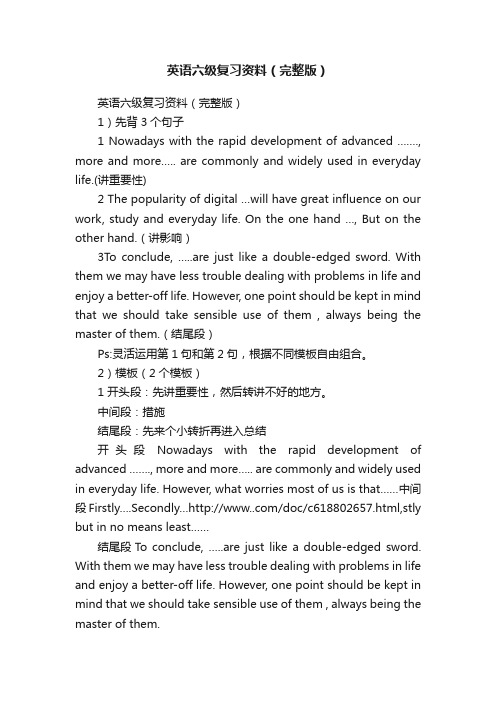
英语六级复习资料(完整版)英语六级复习资料(完整版)1)先背3个句子1 Nowadays with the rapid development of advanced ……., more and more….. are commonly and widely used in everyday life.(讲重要性)2 The popularity of digital …will have great influence on our work, study and everyday life. On the one hand …, But on the other hand.(讲影响)3To conclude, …..are just like a double-edged sword. With them we may have less trouble dealing with problems in life and enjoy a better-off life. However, one point should be kept in mind that we should take sensible use of them , always being the master of them.(结尾段)Ps:灵活运用第1句和第2句,根据不同模板自由组合。
2)模板(2个模板)1 开头段:先讲重要性,然后转讲不好的地方。
中间段:措施结尾段:先来个小转折再进入总结开头段Nowadays with the rapid development of advanced ……., more and more….. are commonly and widely used in everyday life. However, what worries most of us is that……中间段Firstly….Secondly…/doc/c618802657.html,stly but in no means least……结尾段T o conclude, …..are just like a double-edged sword. With them we may have less trouble dealing with problems in life and enjoy a better-off life. However, one point should be kept in mind that we should take sensible use of them , always being the master of them.2 开头段:先讲重要性,然后转讲争论中间段:转折(即列出两种不同人的观点)结尾段:直接进入总结(即你的观点)开头段:It is accepted that …. Plays a significant part for both …, and what’s more , a lot of attention is being drawn to the change of….. However, whether …deserves such an attention , people’s ideas vary.中间段:On the one hand, some peop le hold the view that …..On the other hand, a great many people insist that….结尾段:From my perspective, however…. (你的观点) . Therefore, it’s time that (措施之类的)6级作文万能句子(补充在”…..”里面的万能句子,自己琢磨每个句子放在哪里比较适合)重点背:1)5)6)7)句子,最好全部都被过一遍,自己琢磨怎么用。
有关英语的资料
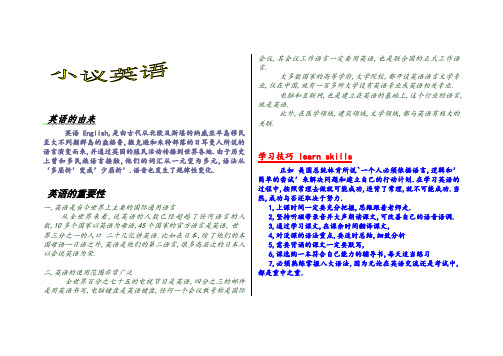
英语的由来英语English,是由古代从北欧及斯堪的纳威亚半岛移民至大不列颠群岛的盎格鲁,撒克逊和朱特部落的日耳曼人所说的语言演变而来,并通过英国的殖民活动传播到世界各地.由于历史上曾和多民族语言接触,他们的词汇从一元变为多元,语法从‘多屈折’变成’少屈折’.语音也发生了规律性变化.英语的重要性一,英语是当今世界上主要的国际通用语言从全世界来看,说英语的人数已经超越了任何语言的人数,10多个国家以英语为母语,45个国家的官方语言是英语, 世界三分之一的人口二十几亿讲英语.比如在日本,除了他们的本国母语--日语之外,英语是他们的第二语言,很多高层次的日本人以会说英语为荣.二,英语的使用范围非常广泛全世界百分之七十五的电视节目是英语,四分之三的邮件是用英语书写,电脑键盘是英语键盘,任何一个会议敢号称是国际会议,其会议工作语言一定要用英语,也是联合国的正式工作语言.大多数国家的高等学府,大学院校,都开设英语语言文学专业,仅在中国,就有一百多所大学设有英语专业或英语相关专业.电脑和互联网,也是建立在英语的基础上,这个行业的语言,就是英语.此外,在医学领域,建筑领域,文学领域,都与英语有极大的关联.学习技巧 learn skills正如美国总统林肯所说`一个人必须依据语言,逻辑和’简单的尝试’来解决问题和建立自己的行动计划.在学习英语的过程中,按照常理去做就可能成功,违背了常理,就不可能成功.当然,成功与否还取决于努力.1,上课时间一定要充分把握,思维跟着老师走.2,坚持听磁带录音并大声朗读课文,可改善自己的语音语调.3,通过学习课文,在课余时间翻译课文,4,对没课的语法重点,要适时总结,细致分析5,需要背诵的课文一定要默写,6,课选购一本符合自己能力的辅导书,每天适当练习7,必须熟练掌握八大语法,因为无论在英语交流还是考试中,都是重中之重.。
英语资料
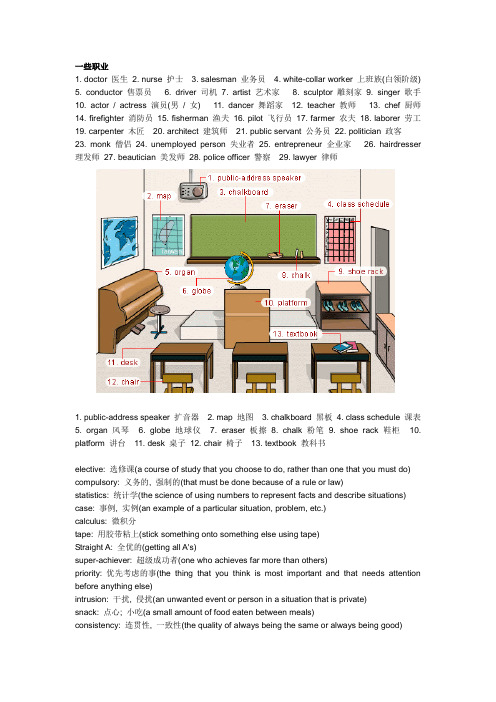
一些职业1. doctor 医生2. nurse 护士3. salesman 业务员4. white-collar worker 上班族(白领阶级)5. conductor 售票员6. driver 司机7. artist 艺术家8. sculptor 雕刻家9. singer 歌手10. actor / actress 演员(男/ 女) 11. dancer 舞蹈家12. teacher 教师13. chef 厨师14. firefighter 消防员15. fisherman 渔夫16. pilot 飞行员17. farmer 农夫18. laborer 劳工19. carpenter 木匠20. architect 建筑师21. public servant 公务员22. politician 政客23. monk 僧侣24. unemployed person 失业者25. entrepreneur 企业家26. hairdresser 理发师27. beautician 美发师28. police officer 警察29. lawyer 律师1. public-address speaker 扩音器2. map 地图3. chalkboard 黑板4. class schedule 课表5. organ 风琴6. globe 地球仪7. eraser 板擦8. chalk 粉笔9. shoe rack 鞋柜10. platform 讲台11. desk 桌子12. chair 椅子13. textbook 教科书elective: 选修课(a course of study that you choose to do, rather than one that you must do) compulsory: 义务的, 强制的(that must be done because of a rule or law)statistics: 统计学(the science of using numbers to represent facts and describe situations) case: 事例, 实例(an example of a particular situation, problem, etc.)calculus: 微积分tape: 用胶带粘上(stick something onto something else using tape)Straight A: 全优的(getting all A's)super-achiever: 超级成功者(one who achieves far more than others)priority: 优先考虑的事(the thing that you think is most important and that needs attention before anything else)intrusion: 干扰, 侵扰(an unwanted event or person in a situation that is private)snack: 点心; 小吃(a small amount of food eaten between meals)consistency: 连贯性, 一致性(the quality of always being the same or always being good)plagiarize: 剽窃; 抄袭(use another person's idea or work and pretend that it is your own)a study sheet: 作弊用的小纸片(a piece of paper with information on it prepared for cheating in an exam)opt: 选择(choose one thing or one course of action instead of another)perish: 灭亡(die, especially in a terrible or sudden way)grant: 研究经费(an amount of money given by the government or an organization for a special purpose, such as research or study)assistantship: 助教职位; 给助教的津贴(the position or money for a teaching assistant)well-rounded: 多方面发展的(good in many aspects)optimal: 最佳的, 最适宜的(the best or most suitable)faculty: 全体教师(all the teachers in a university or department)affiliate: 附属于(be officially connected with a larger organization or group)fund-raising: 集资; 募捐(money raising; fund collecting)professorship: 教授职位(the position of a professor)coordination: 协调(the process of organizing people in order to make them work together effectively)era: 时代(a long period of time in history that is different in some way from other periods) sophomore: 大学二年级学生(a second-year student in a high school or college)elated: 兴高采烈的(extremely happy and excited)transcript: 成绩单(document that has a list of a student's classes and the results they received)GRE: (美国)研究生入学考试(Graduate Record Examinations)flat: 固定的; 无变化的(fixed; unvarying) soar: 剧增(rise quickly)grim: 不愉快的; 讨厌的(depressing; unpleasant)appropriation: 拨款(money set aside by formal action for a specific use)revenue: 收入; 岁入(the income of a government from all sources appropriated for the payment of the public expenses)in-state tuition: 本州居民所交的学费(lower tuition paid by people who live in the state) legislature: 立法机关(an organized body having the authority to make laws for a political unit) inundate: 淹没(cover with water, especially floodwaters)pull one's weight: make one's contributionsup to my ears in homework: fully occupied with homework; having a lot of homework to dohit the books: study hardrub off on somebody: give somebody an example to followrub salt into the wound: make things worseThat figures.: That's to be expected./Just as I thought.1. plateau 高原8. peak 山顶15. beach 海滩2. waterfall 瀑布9. basin 盆地16. horizon 水平线3. forest 森林10. plain 平原17. harbor 海港4. lake 湖11. mountain 山18. ocean 海洋5. pond 池塘12. dam 水坝19. sunset 夕阳6. river 河流13. woods 树林20. island 小岛7. valley 山谷14. sandbar 沙洲1. bow 蝴蝶结2. ribbon 缎带3. balloon 气球4. tie 领带5. fishing pole 钓鱼竿6. box 盒子7. wallet 皮夹8. tobacco 香烟9. pipe 烟斗10. golf tee 高尔夫球座11. cuff links 袖口的链扣12. golf clubs 高尔夫球杆13. golf bag 高尔夫球袋14. coffee mug 咖啡杯15. hat 帽子16. razor 剃刀like father, like son有其父必有其子Dialog 1. Mary and Ted are planning on what to get their dad for Father's Day.玛莉和泰德正在计划父亲节要送什么礼物给爸爸。
(完整版)英语语法复习资料大全

语法复习精品指南(十二)过去一般时的形式l)概说过去一般时由规则或不规则动词的过去式表示;除be外,其余动词没有人称和数的变化。
各种动词的否定结构和一般疑问结构,与现在一般时的否定结构和一般疑问结构相同。
2)动词be 第一人称单数和第三人称单数用was,其余用were。
3)动词have 一律用had,没有人称和数的变化。
4)行为动词一律用过去式,没有人称和数的变化。
现将过去一般时在肯定、否定、一般疑问和简略答语等四种结构。
过去一般时的用法l)表示过去的动作或状态常带有如yesterday,two、days ago,last week,in l958等时间状语以及由when等连词引导的时间状语从句。
如:We had a good swim last Sunday.我们上星期天游泳游得真痛快。
She suddenly fell ill yesterday.昨天她突然病倒。
2)叙述过去连续发生的一件件事。
如:He got up early in the morning,fetched water,swept the yard and then went out to work.他早上起得很早,打水,扫院,然后出去劳动。
3)也可以表示过去一段时间内经常或反复发生的动作。
如:When my brother was a teenager,he played table tennis almost everyday.我弟弟十几岁时,几乎每天都打乒乓球。
[注] 表示过去经常的或反复的动作,也可以用would加动词原形或用used to加动词原形。
如:When he was a child he would go skating every winter.在他还是个孩子时,每年冬天都去滑冰。
Mr. Higgins used to have a big house in downtown.黑根斯先生在市区曾经有座大房子。
英语资料网址大全
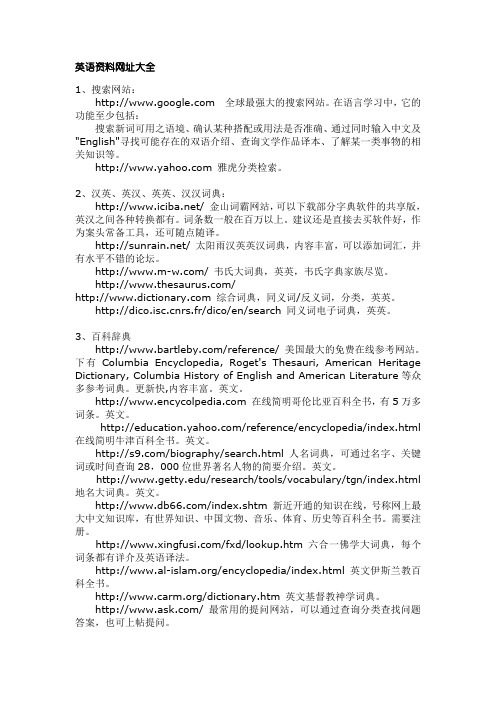
英语资料网址大全1、搜索网站:全球最强大的搜索网站。
在语言学习中,它的功能至少包括:搜索新词可用之语境、确认某种搭配或用法是否准确、通过同时输入中文及"English"寻找可能存在的双语介绍、查询文学作品译本、了解某一类事物的相关知识等。
雅虎分类检索。
2、汉英、英汉、英英、汉汉词典:/ 金山词霸网站,可以下载部分字典软件的共享版,英汉之间各种转换都有。
词条数一般在百万以上。
建议还是直接去买软件好,作为案头常备工具,还可随点随译。
/ 太阳雨汉英英汉词典,内容丰富,可以添加词汇,并有水平不错的论坛。
/ 韦氏大词典,英英,韦氏字典家族尽览。
/ 综合词典,同义词/反义词,分类,英英。
rs.fr/dico/en/search 同义词电子词典,英英。
3、百科辞典/reference/ 美国最大的免费在线参考网站。
下有Columbia Encyclopedia, Roget's Thesauri, American Heritage Dictionary, Columbia History of English and American Literature等众多参考词典。
更新快,内容丰富。
英文。
在线简明哥伦比亚百科全书,有5万多词条。
英文。
/reference/encyclopedia/index.html 在线简明牛津百科全书。
英文。
/biography/search.html 人名词典,可通过名字、关键词或时间查询28,000位世界著名人物的简要介绍。
英文。
/research/tools/vocabulary/tgn/index.html 地名大词典。
英文。
/index.shtm 新近开通的知识在线,号称网上最大中文知识库,有世界知识、中国文物、音乐、体育、历史等百科全书。
需要注册。
/fxd/lookup.htm 六合一佛学大词典,每个词条都有详介及英语译法。
/encyclopedia/index.html 英文伊斯兰教百科全书。
英语学习资料大全(pdf 17页)
Introduction
3
Introduction
Standing on the shoulders of giants Long before Albert Einstein, Isaac Newton (1642–1727) was one of the world’s greatest scientists. He said, ‘If I’ve seen further, it’s because I’ve stood on the shoulders of giants.’ Newton meant that he had used the ideas of older scientists to see his own ideas. He discovered gravity and many ideas about light, space, the planets and the stars.
Newton stood on the shoulders of giants like Galileo.
NOTES giant / 3dZaIRnt / 4
Introduction
In 1687, Newton was a famous professor of mathematics. He described space, the planets and the stars in a new way. For more than 200 years, scientists everywhere agreed with him.
3.
Einstein was 26 years old when he thought
Then, in 1905, Einstein came up with new ideas about
英语单词大全资料
英语单词大全(最新完整版)一、学习用品 (school things)pen钢笔 pencil铅笔 pencil-case铅笔盒 ruler尺子 book书 bag包 comic book漫画书post card明信片 newspaper报纸 schoolbag书包 eraser橡皮 crayon蜡笔 sharpener卷笔刀 story-book故事书 notebook笔记本 Chinese book语文书 English book英语书math book数学书 magazine杂志 dictionary词典二、人体(body)foot脚 head头 face脸 hair头发 nose鼻子 mouth嘴 eye眼睛 ear耳朵 arm手臂 hand 手 finger手指 leg腿 tail尾巴三、颜色(colours)red红 blue蓝 yellow黄 green绿 white白 black黑 pink粉红 purple紫 orange橙brown棕四、动物(animals)cat猫 dog狗 pig猪 duck鸭 rabbit兔 horse马 elephant大象 ant蚂蚁 fish鱼 bird鸟 eagle鹰 beaver海狸 snake蛇 mouse老鼠 squirrel松鼠 kangaroo袋鼠 monkey猴panda熊猫 bear熊 lion狮子 tiger老虎 fox狐狸 zebra斑马 deer鹿 giraffe长颈鹿goose鹅 hen母鸡 turkey火鸡 lamb小羊 sheep绵羊 goat山羊 cow奶牛 donkey驴squid鱿鱼 lobster龙虾 shark鲨鱼 seal海豹 sperm whale抹香鲸 killer whale虎鲸五、人物(people)friend朋友 boy男孩 girl女孩 mother母亲 father父亲 sister姐妹 brother兄弟uncle叔叔;舅舅 man男人 woman女人 Mr.先生 Miss小姐 lady女士;小姐 mom妈妈 dad 爸爸 parents父母 grandparents祖父母 grandma/grandmother(外)祖母grandpa/grandfather(外)祖父 aunt姑姑 cousin堂(表)兄弟;堂(表)姐妹 son儿子 daughter女儿 baby婴儿 kid小孩 classmate同学 queen女王 visitor参观者neighbour邻居 principal校长 university student大学生 pen pal笔友 tourist旅行者 people人物 robot机器人六、职业(jobs)teacher教师 student学生 doctor医生 nurse护士 driver司机 farmer农民 singer歌唱家 writer作家 actor男演员 actress女演员 artist画家 TV reporter电视台记者engineer工程师 accountant会计 policeman(男)警察 salesperson销售员 cleaner清洁工 baseball player棒球运动员 assistant售货员 police警察七、食品、饮料(food & drink)rice米饭 bread面包 beef牛肉 milk牛奶 water水 egg蛋 fish鱼 tofu豆腐 cake蛋糕hot dog热狗 hamburger汉堡包 French fries炸薯条 cookie曲奇 biscuit饼干 jam果酱noodles面条 meat肉 chicken鸡肉 pork猪肉 mutton羊肉 vegetable蔬菜 salad沙拉soup汤 ice冰 ice-cream冰淇淋 Coke可乐 juice果汁 tea茶 coffee咖啡 breakfast早餐 lunch午餐 dinner/supper晚餐 meal一餐八、水果、蔬菜 (fruit & vegetables)apple苹果 banana香蕉 pear梨 orange橙 watermelon西瓜 grape葡萄 eggplant茄子green beans青豆 tomato西红柿 potato土豆 peach桃 strawberry草莓 cucumber黄瓜onion洋葱 carrot胡萝卜 cabbage卷心菜九、衣服(clothes)jacket夹克衫 shirt衬衫 T-shirt丅恤衫 skirt短裙子 dress连衣裙 jeans牛仔裤pants长裤 socks袜子 shoes鞋子 sweater毛衣 coat上衣 raincoat雨衣 shorts短裤sneakers网球鞋 slippers拖鞋 sandals凉鞋 boots靴子 hat(有沿的)帽子 cap便帽sunglasses太阳镜 tie领带 scarf围巾 gloves手套 trousers裤子 cloth布十、交通工具 (vehicles)bike自行车 bus公共汽车 train火车 boat小船 ship轮船 yacht快艇 car小汽车 taxi出租车 jeep吉普车 van小货车;面包车 plane/airplane飞机 subway/underground地铁motor cycle摩托车十一、杂物(other things)window窗户 door门 desk课桌 chair椅子 bed床 computer计算机 board写字板 fan风扇 light灯 teacher's desk讲台 picture图画;照片 wall墙壁 floor地板 curtain窗帘 trash bin垃圾箱 closet壁橱 mirror镜子 end table床头柜 football/soccer足球present礼物 walkman随身听 lamp台灯 phone电话 sofa沙发 shelf书架 fridge冰箱table桌子 TV电视 air-conditioner空调 key钥匙 lock锁 photo照片 chart图表plate盘子 knife刀 fork叉 spoon勺子 chopsticks筷子 pot锅 gift礼物 toy玩具doll洋娃娃 ball球 balloon气球 kite风筝 jigsaw puzzle拼图游戏 box盒子 umbrella 伞 zipper拉链 violin小提琴 yo-yo溜溜球 nest鸟窝 hole洞 tube管子 toothbrush牙刷 menu菜单 e-card电子卡片 e-mail电子邮件 traffic light交通灯 money钱medicine药十二、地点(locations)home家 room房间 bedroom卧室 bathroom卫生间 living room起居室 kitchen厨房classroom教室 school学校 park公园 library图书馆 post office邮局 police office警察局 hospital医院 cinema电影院 bookstore书店 farm农场 zoo动物园 garden花园study书房 playground操场 canteen食堂 teacher's office教师办公室 library图书馆gym体育馆 washroom卫生间 art room绘画教室 computer room计算机教室 music room 音乐教室 TV room电视机房 flat公寓 company公司 factory工厂 fruit stand水果摊pet shop宠物商店 nature park自然公园 theme park主题公园 science museum科学博物馆 the Great Wall长城 supermarket超市 bank银行 country国家 village乡村 city城市 hometown家乡 bus stop公交车站十三、课程(classes)sports体育运动 science科学 Moral Education思想品德课 Social Studies社会课Chinese语文 math数学 PE体育课 English英语课十四、国家、城市(countries & cities)China/PRC中国 America/USA美国 UK联合王国 England英国 Canada/CAN加拿大Australia澳大利亚 New York纽约 London伦敦 Sydney悉尼 Moscow莫斯科 Cairo开罗十五、气象(weather)cold寒冷的 warm温暖的 cool凉爽的 snowy下雪的 sunny晴朗的 hot炎热的 rainy下雨的 windy有风的 cloudy多云的 weather report天气预报十六、景物(nature)river河流 lake湖泊 stream河;溪 forest森林 path小道 road公路 house房子bridge桥 building建筑物 rain雨 cloud云 sun太阳 mountain山 sky天空 rainbow彩虹 wind风 air空气 moon月亮十七、植物(plants)flower花 grass草 tree树 seed种子 sprout苗 plant植物 rose玫瑰 leaf叶子十八、星期(week)Monday星期一 Tuesday星期二 Wednesday星期三 Thursday星期四 Friday星期五Saturday星期六 Sunday星期天 weekend周末十九、月份(months)Jan. (January)一月 Feb.(February)二月 Mar.(March)三月 April四月 May五月 June 六月 July七月 Aug.(August)八月 Sept.(September)九月 Oct.(October)十月Nov.(November)十一月 Dec.(December)十二月二十、季节(seasons)spring春 summer夏 fall/autumn秋 winter冬二十一、方位(directions)south南 north北 east东 west西 left 左边 right右边二十二、患病(illness)have a fever发烧 hurt疼痛 have a cold感冒 have a toothache牙疼 have a headache 头疼 have a sore throat喉咙疼二十三、数词(numbers)one一 two二 three三 four四 five五 six六 seven七 eight八 nine九 ten十 eleven 十一 twelve十二 thirteen十三 fourteen十四 fifteen十五 sixteen十六 seventeen十七 eighteen十八 nineteen十九 twenty二十 thirty三十 forty四十 fifty五十 sixty六十 seventy七十 eighty八十 ninety九十 forty-two四十二 hundred百 one/a hundred and thirty-six一百三十六 first第一 second第二 third第三 fourth第四fifth第五 eighth第八 ninth第九 twelfth第十二 twentieth第二十 thirtieth第三十fortieth第四十 fiftieth第五十 sixtieth第六十 seventieth第七十 eightieth第八十ninetieth第九十 fifty-sixth第五十六二十四、形容词 (adj.)big大的 small小的 long长的 tall高的 short短的;矮的 young年轻的 old旧的;老的 strong健壮的 thin瘦的 active积极活跃的 quiet安静的 nice好看的 kind和蔼亲切的 strict严格的 smart聪明的 funny滑稽可笑的 tasty好吃的 sweet甜的 salty咸的sour酸的 fresh新鲜的 favourite最喜爱的 clean干净的 tired疲劳的 excited兴奋的angry生气的 happy高兴的 bored无聊的 sad忧愁的 taller更高的 shorter更矮的stronger更强壮的 older年龄更大的 younger更年轻的 bigger更大的 heavier更重的longer更长的 thinner更瘦的 smaller更小的 good好的 fine好的 great很好的 heavy 重的 new新的 fat胖的 happy快乐的 right对的 hungry饥饿的 cute逗人喜爱的 little小的 lovely可爱的 beautiful漂亮的 colourful色彩鲜艳的 pretty漂亮的 cheap便宜的 expensive昂贵的 juicy多汁的 tender嫩的 healthy健康的 ill有病的 helpful有帮助的 high高的 easy简单的 proud骄傲的 sick有病的 better更好的 higher更高的二十五、介词(prep.)in在……里 on在……上;在……时候 under在……下面 near在……的旁边 behind 在……后边 next to与……相邻 over在……上面 in front of在……前面二十六、代词(pron.)I我 we我们 you你;你们 he他 she她 it它 they他(她,它)们 my我的 our 我们的your你的;你们的 his他的 her她的二十七、动词(v.)play(.ed)玩;踢 swim(swam)游泳 skate滑冰 fly(flew)飞 jump跳 walk走 run(run)跑 climb爬 fight(fought)打架 swing(swung)荡 eat(ate)吃 sleep(slept)睡觉 like像,喜欢 have(had)有;吃 turn转弯 buy(bought)买 take(took)买;带 live居住 teach (taught)教 go(went)去 study(studied)学习 learn学习 sing(sang)唱歌 dance跳舞row划 do(did)做 do homework做作业 do housework做家务 watch TV看电视 read(read) books读书 cook the meals做饭 water the flowers浇花 sweep(swept) the floor扫地clean the bedroom打扫卧室 make(made) the bed铺床 set(set) the table摆饭桌 wash the clothes洗衣服 do the dishes洗碗碟 use a computer使用计算机 do morningexercises晨练;做广播操 eat breakfast吃早饭 eat dinner吃晚饭 go to school上学have English class上英语课 play sports进行体育运动 get(got)up起床 climb mountains爬山 go shopping买东西 play the piano弹钢琴 visit grandparents看望(外)祖父母 go hiking去远足 fly kites放风筝 make a snowman堆雪人 plant trees种树 draw(drew) pictures画画 cook dinner做饭 read a book看书 answer the phone接电话 listen to music听音乐 clean the room打扫房间 write(wrote) a letter写信write an e-mail写电子邮件 drink(drank) water喝水 take pictures照相 watch insects观察昆虫 pick up leaves采摘树叶 do an experiment做实验 catchbutterflies捉蝴蝶 count insects数昆虫 collect insects收集昆虫 collect leaves收集树叶 write a report写报告 play chess下棋 have a picnic举行野餐 get to到达ride(rode) a bike骑自行车 play the violin拉小提琴 make kites制作风筝 collect stamps集邮 meet(met)见面 welcome欢迎 thank谢谢 love爱 work工作 drink(drank)喝taste尝 smell闻 feed(fed)喂养 shear剪 milk挤奶 look看 guess猜 help帮助 pass 传递 show展示 use使用 clean打扫 open打开 close关上 put放 paint绘画 tell(told)告诉 kick踢 bounce反弹 ride(rode)骑 stop(stopped)停 wait等 find(found)寻找到drive(drove)驾驶 fold折 send(sent)寄 wash洗 shine照耀 become变成 feel(felt)感觉到 think(thought)思考 meet(met)遇见 fall(fell)落下 leave(left)离开 wake(woke) up醒来 put on穿上 take off脱掉 hang up挂起 wear(wore)穿 go home回家 go to bed 上床睡觉 play computer games玩电脑游戏 play chess下棋 empty the trash倒垃圾put away the clothes收拾衣服 get off下车 take a trip去旅行 read a magazine阅读杂志 go to the cinema去看电影 go straight我这里有3~6年级的,包括每个单元和单词翻译, 6个单元的单词都有,希望你能采纳。
英语学习资料
旅游英语(衣食住行)——出国常用必备英语口语一、紧急情况用语●I’ve lost my passport.我的护照丢拉●Where is Chinese Embassy?中国大使馆在哪?●Could you call for a Chinese speaking staff?能找个中文员工给我吗?二、常用英语口语●Thank you!谢谢!●Thanks a lot!多谢!●Excuse me.对不起,麻烦你。
●Excuse the mess.抱歉●Can I help you?需要帮忙吗?●Thank you for helping me.谢谢你的帮助。
●Thanks,anyway.无论如何,我还要感谢你。
●How are you!您好。
●How do you do!初次见面问好。
●(It's)nice to meet you.很高兴见到你。
●Where are you from?请问您从哪来。
●Can I have your name?请问贵姓。
●It was a pleasure meeting you.很高兴认识你。
●Pleased to meet you.很高兴见到你。
●Hope to see you again.希望再见到你。
●Does that mean that I can see you again?这是不是说我以后可以再见到你?●Have a good time.玩得快乐。
●Good luck.祝你好运。
●I hope nothing is wrong.我希望没事。
●What's the matter?怎么了?●Oh,no!Is it serious?糟糕,严重吗?●I'm sorry for you.我真为你难过。
●Have a safe trip home.一路平安,走好。
三、方向单词●East东●South南●West西●North北●Left左●Right右●Straight on往前直去●There那儿●Front前方●Back后方●Side侧旁●Before之前●After之后●First left/right第一个转左/右的路四、问路常用英语●请问怎么前往飞机场?How do I get to the airport?●我怎样到那里?How can I get there?●请问怎么前往地下铁路站?How do I get to the metro station?●请问怎么前往火车站?How do I get to the train station?●从这儿到那里远吗?How far is it trom here?●请问附近有没有医院?Is there a hospital nearby?●请问附近有没有公共厕所?Is there a public toilet nearby?●这条路通到哪里?Where does this way lead to?●请问附近有没有公共电话?Is there a telephone nearby?●它在哪层楼?What floor is it on?●请问附近有没有银行?Is there a bank nearby?●请问附近有没有假日酒店?Is there a holiday hotel nearby?●我走错方向了吗?Am I in wrong direction?●这是去邮局的路吗?Is this the right way to the post office?●请问怎么前往公车站?How do I get to the bus station?●有公共汽车到那儿吗?Does the bus go there?●请问附近有没有餐厅?Is there a restaurant nearby?●对不起,我刚到这儿。
英语复习资料
U1 4.诸如背弃朋友这类事并不受法律制约,所以才有了我们称作的道德法庭Laws do not regulate such things as betrayal to friends, that is why there is what we call the court of morality 5.有人把今天的文化描述为快餐文化。
无论做什么事,人们只是追求用最短时间达到最大的满足Today’s culture is described as fast-food culture, whatever they may be; people just pursue the greatest satisfaction within the shortest time.6.常言说,天下没有免费的午餐。
如果你想要什么,就得去挣As the saying goes, there is no such thing as a free lunch. If you want something, go and earn it.U2 1.无论是友情还是爱情,你都不可能期待自己付出最少而得到最多。
In either friendship or love, you should never expect to receive the maximum while you give the minimum.2.我把全部希望寄托在他的承诺上,结果却发现他根本不是个真诚的人。
I built all my hopes on his promises, only to find that he was not a man of sincerity at all.3.我们带母亲去了所有我们能找到的最好的医院,但一切努力都是徒劳的,母亲还是没能熬过那次疾病。
We took mother to all the best hospitals we could find, but all our efforts were in vain; she failed to survive the disease.U3 1.千百年来哲学家们费尽心机从各自的角度阐释何为幸福.For thousands of years philosophers have taken pains to explain the meaning of happiness from their own points of view.2.刚上大学的时候,突然发现自己得处理所有日常事物,知道那是自己才觉得在父母身边生活真是幸福。
- 1、下载文档前请自行甄别文档内容的完整性,平台不提供额外的编辑、内容补充、找答案等附加服务。
- 2、"仅部分预览"的文档,不可在线预览部分如存在完整性等问题,可反馈申请退款(可完整预览的文档不适用该条件!)。
- 3、如文档侵犯您的权益,请联系客服反馈,我们会尽快为您处理(人工客服工作时间:9:00-18:30)。
Science and technology
Animal testing
Be nice to mice
and they may return the favour
ONLY one drug of every ten successfully tested in laboratory animals ends up
working in people.
One reason, of course, is that mice are not men.
Another, though, might have to do with the fact that whereas human patients
are afforded all manner of creature comforts, their animal proxies are not.
Although medical science's favourite critters relish temperatures of a little over
30°C, laboratories routinely keep them at five or ten degrees below that.
This is not in order to torture the beasts but, rather, because when kept warm
they are unmanageably aggressive.
The downside is that they have to eat more than they otherwise would, in order
to keep their bodies warm.
That changes their physiology.
And that in turn alters the way they metabolise drugs, with possibly confusing
results.
Joseph Garner, of Stanford University, thinks the answer is to keep the labs
cool,
but let mice cope with the low temperatures as they do in their natural habitat:
not by eating more but by building nests.
So far, though, no one has a clear idea of how much nesting material is needed
to keep mice happy.
Dr Garner and his colleagues therefore decided to find out.
They have just reported their results in the Public Library of Science.
Dr Garner and his team let each of their mice, 36 males and as many females
from three strains commonly used in trials, roam free in two cages connected by
a narrow tube.
One cage was kept constant at one of six temperatures between 20°C and 35°C.
The other was maintained at 20°C but was stocked with up to ten grams of
finely shredded paper, which the mice could use to weave a nest.
The idea was to check whether the animals would rather build a nest in the
cooler cage or move to the warmer one, possibly tugging nesting material along
with them strand by strand.
The researchers found that the rodents' preferences varied slightly between
strains, as well as between sexes, confirming that there is no single set of
conditions in which all mice feel cosy.
In general, though, with little nesting material around, the animals laboriously
carried strands of paper over to the warmer spot, one or two at a time.
But leave at least six grams of paper in the chilly cage, and many mice will
prefer instead to brave the cold and build a nest there.
That seems a small price to pay for better drug trials.
科学技术
动物实验
善待小鼠
或许它们会报以恩情
在动物实验中测试成功的药物中仅仅有十分之一最终被用于人类。
其中一个原因显然是老鼠与人有本质的不同。
另一个原因则是人类患者会得到无微不至的照顾与舒适的环境,而被用于实验的动物则不
会。
药物科学中饲养动物的最适温度略高于30°C,然而,在实验室中,它们所处的温度通常比
最适温度低五到十摄氏度。
这样做并不是有意虐待动物,而是因为在温暖的环境中,动物具有不可控制的攻击性。
降温饲养的不足之处是动物为了保持体温会吃掉比平常更多的食物。
这样会影响动物的生理机能,
从而改变它们对药物的代谢情况,以至于产生令人困惑的实验结果。
斯坦福大学的约瑟夫加纳认为解决这个问题的办法是保持实验室里较低的温度,
但是让小鼠的自然习性—筑建巢穴,而非吃更多的食物—来应对低温。
可是到目前为止,人们还不能确定提供多少筑巢材料才能使小鼠保持良好的状态。
然而,加纳博士和他的同事决心找出答案,
不久前他们将实验结果发表在《公共科学图书馆》杂志上。
加纳博士和他的团队将36只雄鼠与同等数量的雌鼠置于由一条细管道连接的两只笼子里,
并让它们自由活动,这些小鼠来自临床试验中常用的三个种系。
其中一只笼子保持在20°C到35°C之间指定的六个温度中的一个;
另一个则维持在20°C,但其中填入了10克经精心加工过的碎纸屑。
此举是为了观察这些小动物会在较冷笼子里建一个巢穴,还是会通过管道爬至较暖和的笼子
中,甚至还可能不辞辛苦地将这些筑巢材料一点一点地带过去。
研究人员发现这些啮齿动物的喜好随着种系和性别的不同而有轻微的改变。此项结果表明,
并没有单一的一套环境条件能让所有的小鼠感到舒适。
不过通常情况下,在周围没有筑巢材料时,小鼠们会勤劳地将纸屑一点一点地运到更暖和的
笼子里,
但会在较冷笼子里留下至少6克的纸屑。而且许多小鼠会勇于面对寒冷,并在那里筑起自
己的家。
如此情况下,为了更好的进行药物试验,这已算是极小的代价了。
